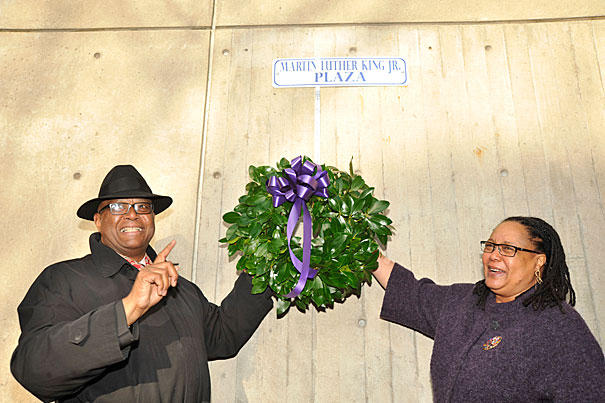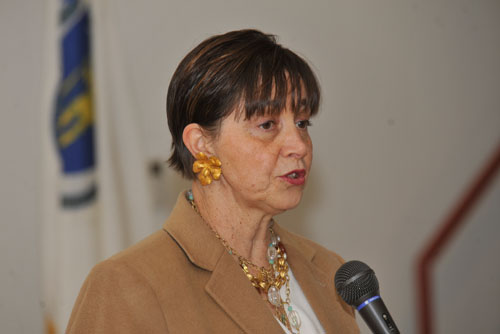
Acting Cambridge Mayor Kenneth E. Reeves (left) and Harvard College Dean Evelynn M. Hammonds lay a wreath to commemorate Martin Luther King Jr. Day at the Cambridge Public Library. In her keynote address, Hammonds called for educators to help students “make explicit their own values and build their own ‘beloved communities.’ ”
Photos by Jon Chase/Harvard Staff Photographer
Dean fetes King’s ‘beloved community’
Calls on educators to help students value difference, find common ground
Delivering the keynote address Sunday at the Cambridge Public Library’s 37th annual celebration of Martin Luther King Jr. Day, Harvard College Dean Evelynn M. Hammonds called for educators to help students “make explicit their own values and build their own ‘beloved communities.’ ”
The event, which took place nearly two weeks after the national holiday commemorating King’s birth, included a wreath-laying ceremony and remarks from acting Cambridge Mayor Kenneth E. Reeves and Susan M. Flannery, the city’s director of libraries. Hammonds’ appearance was also part of the John Harvard Book Celebration program, a lecture series that celebrates the University’s 375th anniversary by bringing some of Harvard’s most renowned thinkers to the 34 branches of the Boston and Cambridge public libraries.
Hammonds filled her address, “Teaching About Values: Revisiting King’s Beloved Community,” with examples from her own experience as dean and as a student. She said that undergraduates look to her and to the College administration for guidance when they arrive at Harvard and find themselves in “the most diverse community that they have ever lived in.”
“The freshmen who enter Harvard are increasingly asking us to explain what the College and the University stand for,” she said. “The differences they encounter include differences in socioeconomic background; religion; sexual orientation; culture, race and ethnicity.”

Hammonds said that the need to promote the values of the College and to teach students how to live respectfully with people who do not look, think, or act as they do gave her a greater appreciation for King’s thinking on diversity and community.
“The beloved community was for King a ‘… completely integrated society … of love and justice wherein brotherhood would be an actuality in all of social life,’ ” Hammonds said, quoting the scholars of Christian ethics Kenneth L. Smith and Ira G. Zepp Jr. “King was trying to imagine the kind of community he wanted to see America become after segregation was overthrown.”
Although King hoped for a community that transcended all differences — especially those of race — Hammonds said that this vision had evolved over the years since his death. She endorsed the writer bell hooks’ notion of a beloved community “formed not by the eradication of difference, but by its affirmation, by each of us claiming the identities and the cultural legacies that shape who we are and how we live in the world.”
Valuing difference is not easy, Hammonds said, and told a story from her own experience as a student to illustrate the point. One of only three African-American women in a class of more than 200 at the Georgia Institute of Technology, Hammonds was assigned to an engineer who had never worked with a student who was black or female. Though their first interactions were awkward and uncomfortable, Hammonds said the two eventually found a way to connect.
“My enthusiasm about lasers began to match his,” she said. “We recognized that the only thing we had in common was that laser, and we forged a relationship around our desire to understand the properties of solids using lasers. Our common commitment to our work helped transcend our many other differences.”
Hammonds closed by saying that it was the role of educators to ensure that young people have the kind of experiences she had as an engineering student. The act of finding common ground with others from diverse backgrounds and perspectives will make it possible for students to build community and also help them to define their own identities.
“I have a suspicion that their beloved communities won’t look like ours,” she said. “But if we live and explain our values well, I know they will move us even closer to King’s amazing vision.”




